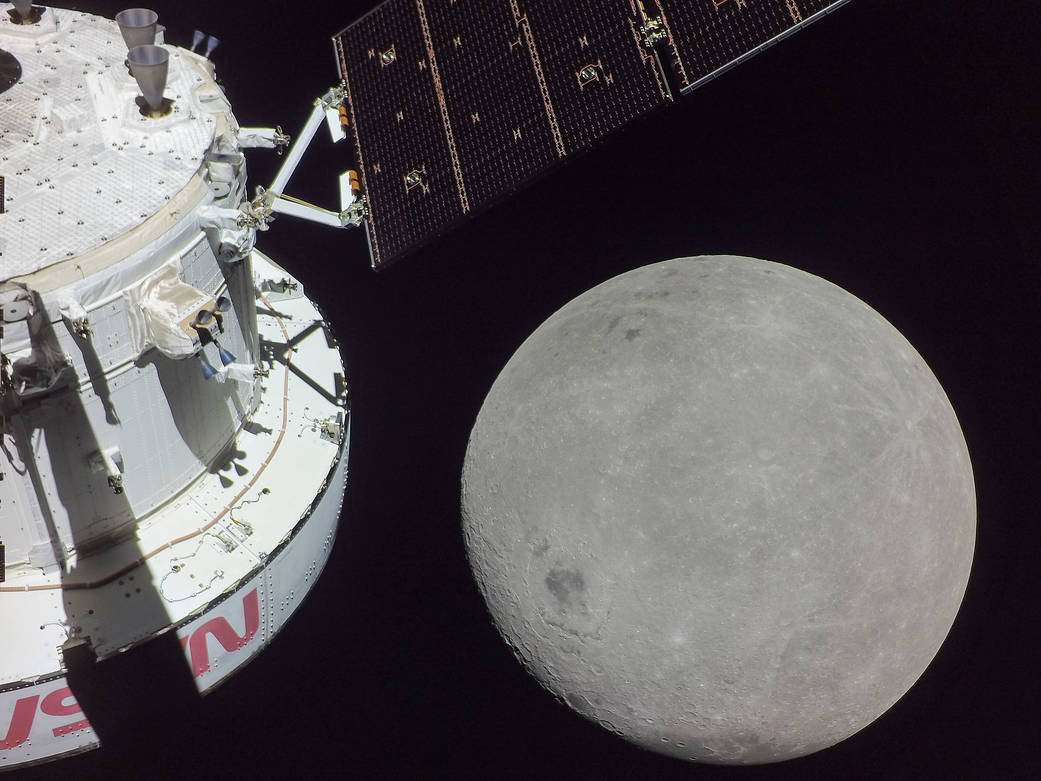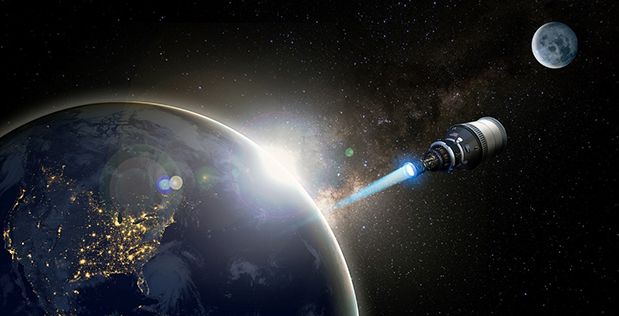A. T. Mahan Identified American Space Incumbency in 1890
A. T. Mahan identified conditions determining national Seapower; they apply to American Spacepower

America is going back to the Moon - this time with the intention to stay. Permanent presence on the Moon is planned by NASA. With the Artemis 1 launch and cislunar maneuvers, substantial commercialization of low-Earth orbit (LEO) and geosynchronous orbit (GEO) by SpaceX, Maxar, Amazon, and many others, the United States is putting its money where it's mouth is - in space. The expected economic value of space is expected to grow from $0.4T to $1-1.4T by 2030-2040.
Alfred Thayer Mahan, the father of naval grand strategy in the United States, put pen to paper describing six conditions that determine a nation's suitability for building and benefiting from seapower. Mahan's principle conditions are relevant and applicable to American space exploration, commercialization, and settlement efforts.
Who was Alfred Thayer Mahan, what is seapower, and why do his 130-year-old conditions apply to American space endeavors?
Alfred Thayer Mahan and Seapower

A United States Navy Captain, A. T. Mahan is most famous for his analysis and theory on seapower and grand strategy. Cpt. Mahan wrote extensively on naval history, attempting to extract fundamental principles of naval grand strategy from all available historical naval records. He served from 1859-1886, became a lecturer and later President of the Naval War College, and remained active in his writings on seapower until passing shortly after the outbreak of the First World War (Wikipedia).
From his extensive readings, Mahan articulated a synergistic relationship between a nations' maritime commerce and the navy's ability to protect that commerce. This conception of a national commercial and military naval capabilities is called Sea power (today, simply 'Seapower'). In his own words:
"Sea power thus comprises the interrelationship of commercial shipping, sea lines of communication linking markets, and warships that protect the system." [pg. 15, Mahan, Corbett, and the Foundations of Naval Strategic Thought]
Mahan formulated his Seapower theories during a time of transition from oaken sailing ships to iron-bound steam ships. Are his ideas as independent of technology as he had hoped? How are Mahan's ideas on Seapower related to American's space endeavors today?
Mahan's Conditions and Space Exploration, Commercialization, and Settlement
Lets briefly examine each of Mahan's six necessary conditions for national seapower in the context of American space endeavors.
1) Geographical Position
Two passages from Mahan's writings give a good summary of what he means by Geographical Position:
"[I]f a nation be so situated that it is neither forced to defend itself by land nor induced to seek extension of its territory by way of the land, it has, by the very unity of its aim directed upon the sea, an advantage as compared with a people one of whose boundaries is continental." [pg. 29, The Influence of Sea Power Upon History]
As has been observed by many others, the United States meets this condition for naval applications, but what about space? It seems clear that being continentally isolated on Earth can only reinforce such a position in space. Mahan further writes:
"If [...] Nature has so placed a country that it has easy access to the high sea itself, while at the same time it controls one of the great thoroughfares of the world's traffic, it is evident that the strategic value of its position is very high." [pg. 32, The Influence of Sea Power Upon History]
This statement is straightforward, and it's applications to space are nearly self-evident.
Tongue-in-cheek, all nations are more or less the same distance from space, defined as being above the Von Karman line at 100km altitude. Easy access to space can measured through dispersion and breadth of launch sites, facilities, and related infrastructure. The United States sports the most such capabilities of any nation.
What about 'control' of 'thoroughfares of the world's traffic'? Many have argued that space is a commons, open for use to all - much like the sea. This is, for many good reasons, the current norm. America's proliferation of spacecraft in LEO, GEO, and plans to build the Lunar Gateway station around the Moon indicate that, if nothing else, the United States is the preeminent spacefaring nation.
The formation of the USSF in 2019 and its doctrine say its objectives are the protection of commerce and ensuring that space continues to be a commons available to all. One aspect of 'control' in space can be interpreted as deterrence from actions that disrupt commerce. In this respect, the United States exerts more control over the thoroughfares of space traffic - LEO, GEO and cislunar - than any other nation.
2) Physical Conformation
One focus of Mahan's writings is the nature of a nations seaboard. With respect to space, a nations seaboard is LEO; all vehicles going between Earth and space must interface with LEO. Mahan explained further:
"[T]he easier access offered by the frontier to the region beyond, [...] the greater will be the tendency of a people toward intercourse with the rest of the world by it." [pg. 35, The Influence of Sea Power Upon History]
He further writes:
"Numerous and deep harbors are a source of strength and wealth, and doubly so if they are the outlets of navigable streams, which facilitate the concentration in them of a country's internal trade [...]." [pg. 35, The Influence of Sea Power Upon History]
With little effort, these statements are easily adapted to space. The orbital analog to 'numerous and deep harbors' and 'navigable streams' are infrastructure associated are launch capabilities and reentry capabilities to facilitate transport between LEO and Earth, as well as refueling capabilities in LEO, GEO, and at the Moon.
As mentioned above, the United States exceeds all other nations in launch capabilities and infrastructure. Further, it is the leading nation in demonstrating on-orbit docking and refueling in LEO and GEO. That such cislunar activities are considered as commercial endeavors extend to the Moon should come as no surprise. American infrastructure and capabilities provide it peerless utilization of the physical conformation of space.
3) Extent of Territory
While he did not have much to say on this topic, Mahan did emphasize that:
"[I]t is not the total number of square miles which a country contains, but the length of its coast-line and the character of its harbors that are to be considered." [pg. 43, The Influence of Sea Power Upon History]
Here, we may interpret the 'length of coastline' as the 'area of access' that territories have in the space domain. This is sensible for space endeavors. These geographic features suggest that the United States is again well-positioned. American continental and territorial holdings around the world have diverse access to LEO, GEO, and cislunar trajectories, whether they be for traffic management or communications purposes. The United States' surplus of line-of-sight access using these modalities exceeds that of any other nation.
4) Number of Population
Ahead of his time, Mahan considered the human resources of a nation to be a paramount feature of its Seapower:
"[...Regarding] population, it is not only the grand total, but the number following the sea, or at least readily available for employment on ship-board and for the creation of naval material, that must be counted." [pgs. 44, 45, The Influence of Sea Power Upon History]
Any industrial or commercial endeavor in space, let alone exploration, requires a large and complex workforce in manufacturing, services, engineering, and research & development.
At 331M, the United States ranks third in overall population on Earth. Of this population, an estimated 1-2M Americans are directly or indirectly involved in the space industry. This fraction and quantity is amongst the highest in the world.
In the long term, demographic trends will serve to exacerbate this American advantage - western Europe (less France), Japan, China, and Russia all have decreasing populations either now or shortly. This trend is not expected to change this century.
The importance of space-related human capital is not lost on the USSF:
"Our greatest assets are the men and women - the space professionals [...]" [pg. 46, Spacepower - Doctrine for Space Forces]
Indeed.
5) Character of the People
Another foundational element of national seapower is defined by Mahan as the character of the people. Using this terminology Mahan is considering whether a national culture predisposes its people to maritime activities, or the opposite.
Speaking positively of the English and Dutch, Mahan expanded:
"They were by nature business-men, traders, producers, negotiators." [pg. 51, The Influence of Sea Power Upon History]
In turn, Mahan's thesis is that this led to a virtuous cycle, resulting in more commerce and larger navies:
"At home [the Dutch and English] became great as manufacturers; abroad, where they controlled, the land grew richer continually, products multiplied, and the necessary exchange between home and the settlements called for more ships. Their shipping therefore increased with these demands of trade, and nations with less aptitude for maritime enterprise, even France herself, great as she has been, called for their products and for the service of their ships." [pg. 52, The Influence of Sea Power Upon History]
In a less anecdotal passage, Mahan identified national cultural characteristics that lead to these trade-based expansions. They include a nations tendency to trade, financial risk-taking, and initiative for independent action.
Common sense argues these cultural tendencies are necessary for a thriving space-based economy. Casual observation concludes that America is endowed with an abundance of each of them.
(To be explicit, the author is not proposing or endorsing neo-colonialism or exploitative economic systems in space)
Previous generations mythologize Americans as explorers; current generations tend to reinforce this view. Many have already called space a 'new frontier' or the 'Wild West.' There are elements of truth in those statements, though perhaps Carl Sagan's observation below captures the nature-vs-nurture aspect of cultural vs human character:
"We were wanderers from the beginning." [Carl Sagan, Pale Blue Dot]
In any event, The USSF seems to agree with Mahan:
"National Spacepower requires explorers, diplomats, entrepreneurs, scientists, developers, and warfighters." [pg. 48, Spacepower - Doctrine for Space Forces]

6) Character of the Government
There is little to say about the United States government without ruffling feathers. Mahan's views from 1890 are:
"[I]n the matter of Seapower, the most brilliant successes have followed where there has been intelligent direction by a government fully imbued with the spirit of the people and conscious of its true general bent." [pg. 58, The Influence of Sea Power Upon History]
This observation is straightforward to transplant to American national space endeavors in exploration, commercialization, and settlement. The benefits of coherent policy and whole-of-government united effort in supporting national space endeavors are plain to see.
While maintaining the non-partisan nature of this article, consider recent recommendations from the 2022 State of the Space Industrial Base, written and published by the Defense Innovation Unit (DIU):
"A North Star Vision for economic development and human settlement in space should be bi-partisan, multi-generational, and inspirational to all who embrace America’s values." [pg. 2, State of the Space Industrial Base 2022]
Clearly, contemporary thinkers and study participants agree with Mahan's conditions on the 'Character of the Government.' The report goes into further detail, specifically recommending:
"Elevate the Office of Space Commerce (OSC) to report directly to the Secretary of Commerce. In a whole-of-nation strategy where commerce and economic growth are central to strategic competition, the OSC cannot be buried under our weather service." [pg. 3, State of the Space Industrial Base 2022]
The author couldn't agree more with this recommendation, and has argued in favor of empowering OSC further at senate testimony in 2021. Skeptical optimism seems in order, given the timely and cogent observations voiced by respected members of the USSF and industrial base.
Conclusions
Mahan's National Seapower Conditions Applicable to Space Endeavors
Now, to deliver on conclusions promised. First, cursory inspection of Mahan's Necessary Conditions on National Seapower tells us that, with minimal handwaving, they are pertinent and applicable to national space endeavors in exploration, commerce, and settlement. Comparisons between seapower and Spacepower are apt, and not just artifacts of Star Trek or popular culture; Mahan's principles - written over 130 years ago - persevere against the passage of time and transplantation from the sea to the void.
Geography of Space - Astrography - Is the Biggest Determining Factor
Second, as the careful reader and many others have observed regarding seapower:
"The first three of Mahan’s elements deal with geography. Devoting half the elements to geographic factors denotes its importance within his sea power thesis as well as a level of geographic determinism." (pg. 24, [[Mahan, Corbett, and the Foundations of Naval Strategic Thought]])
It is a short hop to claim that the space equivalent of geography - Astrography (Gen. Shaw, et al., Sailing the New Wine-Dark Sea), dominates half of Mahan's conditions. We are tempted to conclude that, in national space endeavors, half of the conditions are functions of Astrography, which suggests a certain level of 'astrographic determinism.'
The United States is the Incumbent Favorite for Space Exploration, Commercialization, and Settlement
Third and finally, the United States is well positioned for future space endeavors in exploration, commerce, and settlement, as evaluated against most or all of Mahan's conditions. America scores well on all geographic- (astrographic-) related conditions, as well as the number of population and national character. While it is up to the reader to assess the character of the government, the United States scores well across all or most national conditions for space endeavors in exploration, commercialization, and settlement.
Subscribe to the Newsletter
If you enjoy this content, show your support by subscribing to the free weekly newsletter, which includes the weekly articles as well as additional comments from me. There are great reasons to do so and subscriptions give me motivation to continue writing these articles! Subscribe today!


